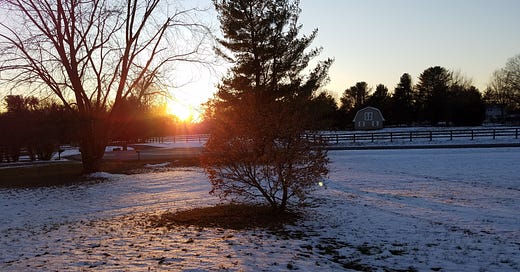In the sermon I preached this past Sunday, I noted that Mary was the one to speak up in the story about the wedding at Cana. She points out that there is no more wine. If you were to pause there, you’d notice a point of tension. Mary, Jesus, the disciples and others are at a wedding reception, and the wine is all gone. What is going to happen? The tension you feel is potential energy. It’s the rise to the climax of the story, laying out the problem to be resolved. How will Jesus respond? There's something unknown here and in need of resolution.
Potential energy, scientifically speaking, is the energy held by an object in relation to its position to others. Mary’s words hold energy. It’s unknown how that energy will transform into action, although Mary clearly has expectations of Jesus. The energy has yet to be released until Mary resolves the problem herself, telling the servants, “Do whatever he tells you.” However, before the resolution, the energy is waiting, expectant to be changed even though it is still unknown how.
This stored potential energy is much like the dormancy of winter. Hibernating bears, bare trees, nuts, and seeds stored underground, all waiting for springtime. Winter is full of potential energy as we bide our time until the weather warms up again. The energy is largely unseen and out of sight as nature burrows down, conserving energy, and protecting itself against the cold. This stage is a normal part of the lifecycle.
What if we accepted dormancy as a normal part of our lives? We have times of more activity, and other seasons of more rest. Ebb and flow are generally a pretty natural process, even as it conflicts with the capitalist view of ourselves as machines with the expectation that we can always function at maximum capacity. Instead, energy needs time to build back up.
Potential energy is needed before it can turn into active, kinetic energy. This is the bike at the top of the hill. This is Mary speaking up, naming the problem, before the problem is resolved. It’s a liminal time, and a necessary time, before you can move into new growth. Seeds need time to germinate. Bears need to hibernate. And the buried acorns that squirrels forgot turn into new oak trees. It’s okay to take time to yourself, to conserve your energy, to help prepare yourself for the next thing.
In the liturgical calendar, we’re in the “season after the Epiphany,” the weeks between Epiphany on January 6 and the start of Lent on Ash Wednesday. The number of weeks varies each year, this year falling almost two months later, on March 5. We’re at the start of a new year and a quieter liturgical season. What do you need this time to prepare for? What is lying dormant in you, waiting for its season to grow?




